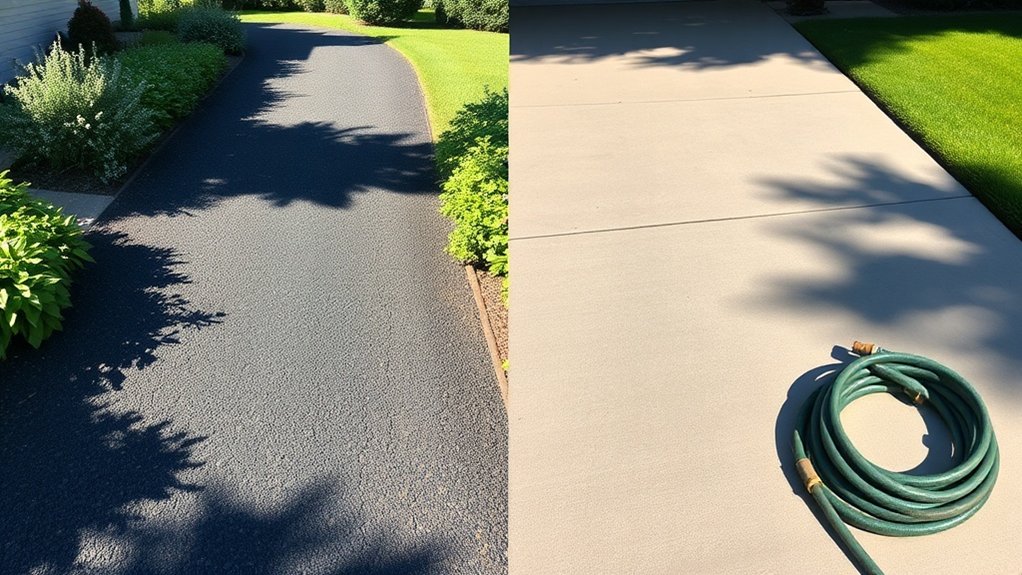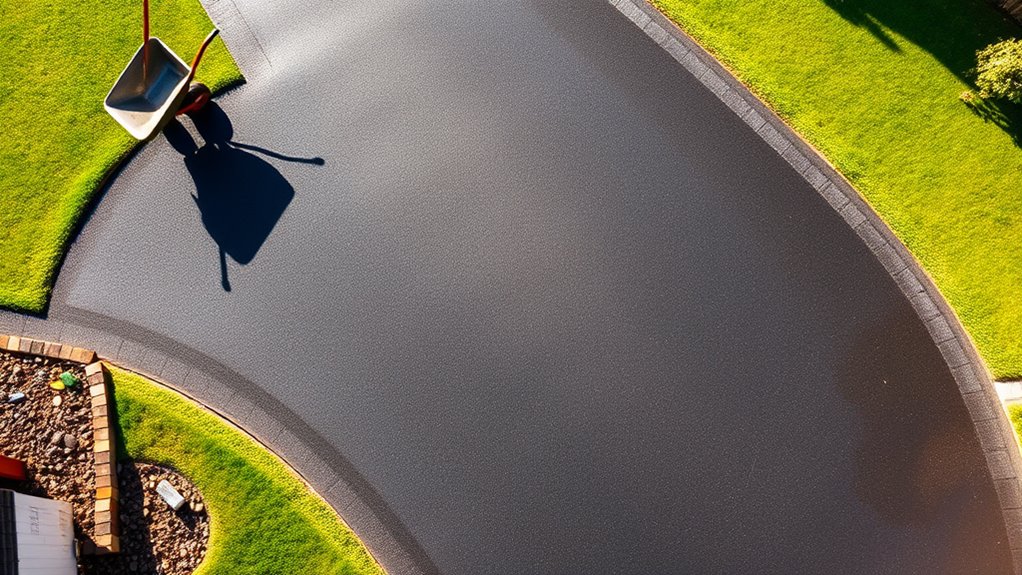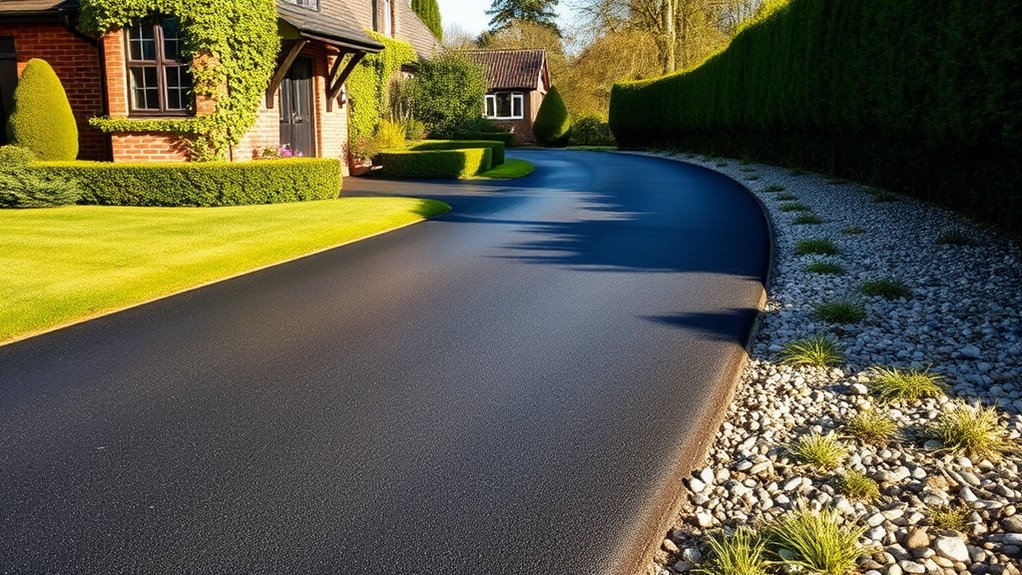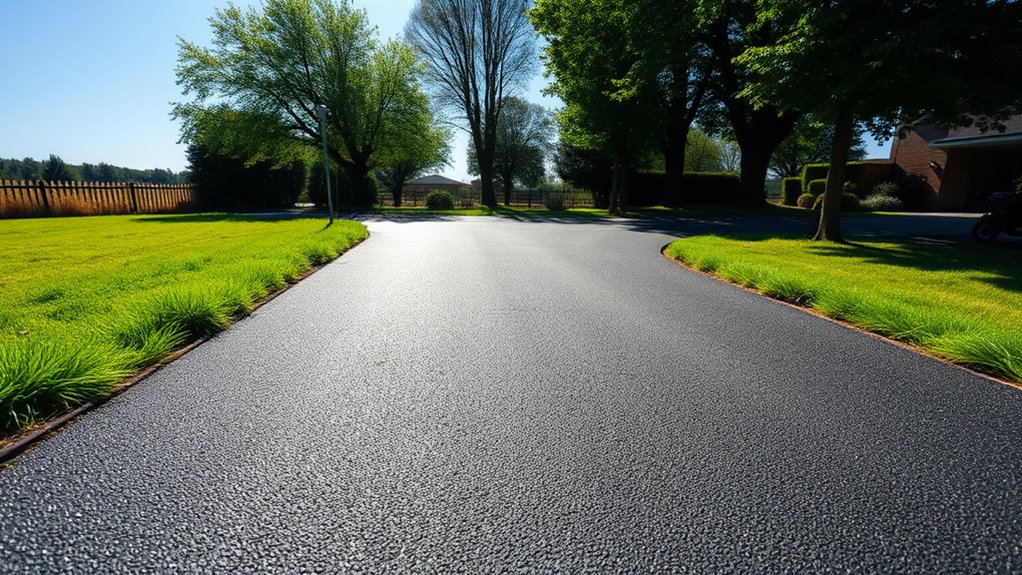DIY driveways often demand more upkeep than those installed by professionals. Poor installation can result in quicker deterioration, leading to more frequent repairs. Different materials come with distinct maintenance requirements, and the time you need to invest can accumulate rapidly. Regular cleaning and inspections are crucial to avoid major damage. If you spot issues like cracks or standing water, it could indicate the need for professional assistance. Learn how to extend your driveway’s lifespan and tackle maintenance challenges effectively.
Table of Contents
ToggleKey Takeaways
DIY driveways often require more regular inspections and maintenance due to possible installation errors and inconsistencies in materials. Keeping them clean and well-maintained is crucial to prevent early wear, which can be more demanding for those who have taken the DIY route.
Seasonal tasks, such as removing debris and pressure washing, can be time-consuming for DIY driveway owners. If the installation isn’t done correctly, it can lead to expensive repairs later, increasing the need for ongoing maintenance. Generally, DIY driveways may need resealing or repairs more often than those installed by professionals.
Understanding DIY Driveway Maintenance Requirements

When undertaking DIY driveway maintenance, it’s vital to know what’s required to keep your surface in good shape.
Regular cleaning is key; it prevents debris from building up and trapping moisture. Seasonal cleaning, particularly after winter and autumn, is essential to tackle salt damage and organic stains. Additionally, using the right driveway material can influence maintenance needs, as some materials, like gravel, may require more frequent replenishment compared to others. Routine inspections help you spot early signs of damage, allowing you to carry out minor repairs like sealing cracks, which can significantly prolong your driveway’s life.
Using a pressure washer twice a year can effectively remove grime and prevent deterioration. Furthermore, establishing a regular maintenance schedule based on expected traffic levels is crucial for ensuring long-term durability.
Moreover, it’s important to adjust your maintenance approach according to the seasons. For instance, avoid using metal tools in winter to prevent unnecessary damage. Being consistent with these practices can save you money and enhance durability over time.
Common Driveway Materials and Their Maintenance Needs
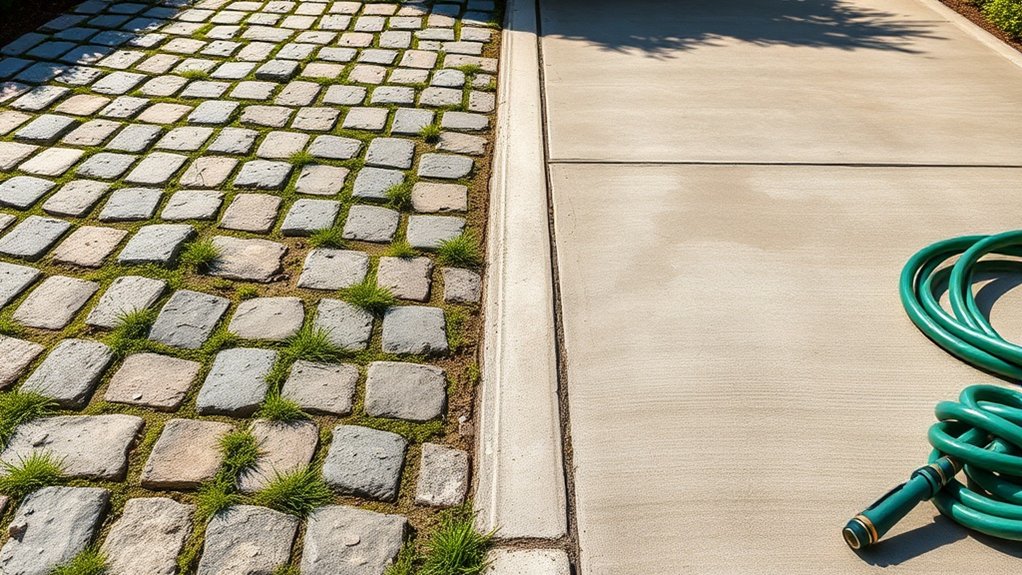
Maintaining your driveway effectively depends on the material it’s made from, as each type has its own specific maintenance needs.
- Asphalt: This material requires resealing every 2 to 5 years to ensure it lasts. Regular inspections and prompt repairs can further enhance its lifespan.
- Concrete: While it’s quite durable, it may need occasional sealing but generally requires minimal upkeep.
- Brick: Known for its durability, brick allows for easy replacement of loose pieces and needs little maintenance overall.
- Interlocking Pavers: These are easy to look after, requiring just the occasional clean.
- Gravel: Although it’s a budget-friendly option, gravel needs frequent topping up and can be tricky in winter.
Understanding these maintenance needs will help you choose the best driveway material for your requirements, ensuring it remains in good condition for years to come.
The Benefits and Drawbacks of DIY Maintenance
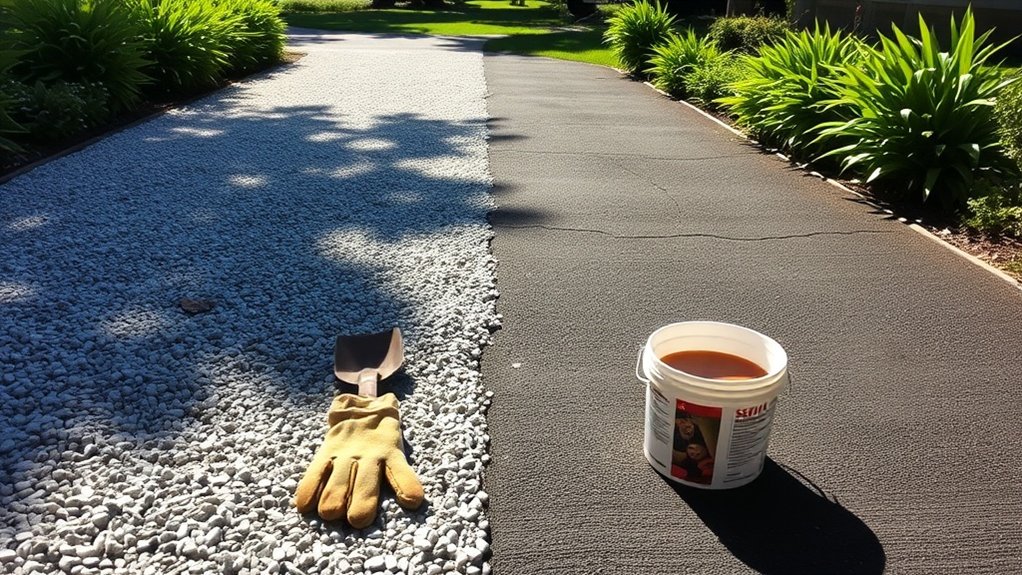
When considering DIY driveway maintenance, you’ll discover that budget-friendly solutions can save you money over time. However, be ready for tasks that can be quite time-consuming and require consistent effort. Your level of skill will also play a significant role in how well you manage these challenges, which can directly affect the condition of your driveway. For example, if you’re comfortable with basic tools, sealing cracks might be a straightforward job, but if not, it could end up being more costly in the long run. Ultimately, properly installed paver driveways can last 25-50 years, making the effort you put into maintenance worthwhile. Additionally, understanding the importance of proper drainage solutions can significantly enhance the longevity and performance of your driveway.
Cost-Effective DIY Solutions
While DIY driveway maintenance can save you money, it’s important to consider the potential downsides. By using the right tools, you can extend the life of your driveway without breaking the bank.
However, poor repairs might lead to higher costs later on.
- Save on labour costs (40-60% of total expenses).
- Affordable materials (crack fillers from £3–£15/sq ft).
- Replenishing gravel is cheaper than professional installation.
- Preventative maintenance helps avoid expensive fixes.
- Tailor your repair techniques to suit your driveway’s needs.
In summary, DIY solutions can be cost-effective, but be mindful of the long-term costs if repairs aren’t done properly.
It’s crucial to find a balance between immediate savings and lasting durability to keep your driveway in good shape.
Time-Consuming Maintenance Tasks
Time-consuming maintenance tasks can often feel daunting, particularly when it comes to DIY driveway care. Sticking to a regular maintenance schedule is crucial for extending your driveway’s lifespan.
Regular inspections and cleaning can help prevent significant damage; neglecting these tasks could lead to expensive repairs. Make sure to clear away debris, wash the surface, and promptly fill in cracks to prevent water from seeping in and causing further damage.
It’s also important to adjust your cleaning methods seasonally to protect against harsh weather conditions. While resealing your driveway every two to three years might take up a weekend, it’s a worthwhile investment that can save you money in the future.
Balancing these tasks can be tricky, but they’re essential for proper driveway maintenance.
Skill Level Requirements
For effective DIY driveway maintenance, understanding the required skill level is essential for achieving lasting results. Here are some key points to consider:
- Acknowledge your limitations to prevent worsening damage.
- Different materials, such as tarmac or block paving, require specific repair techniques.
- Seasonal maintenance knowledge, like clearing leaves in autumn, is vital for longevity.
- Incorrect product application can lead to expensive mistakes.
- Being familiar with your driveway’s condition allows for timely repairs.
Taking the time to learn and invest in the right tools can save you money and extend your driveway’s life.
However, lacking skills in tool usage can lead to further deterioration, so it’s important to assess your abilities before starting any maintenance tasks.
Cost Comparison: DIY vs. Professional Maintenance
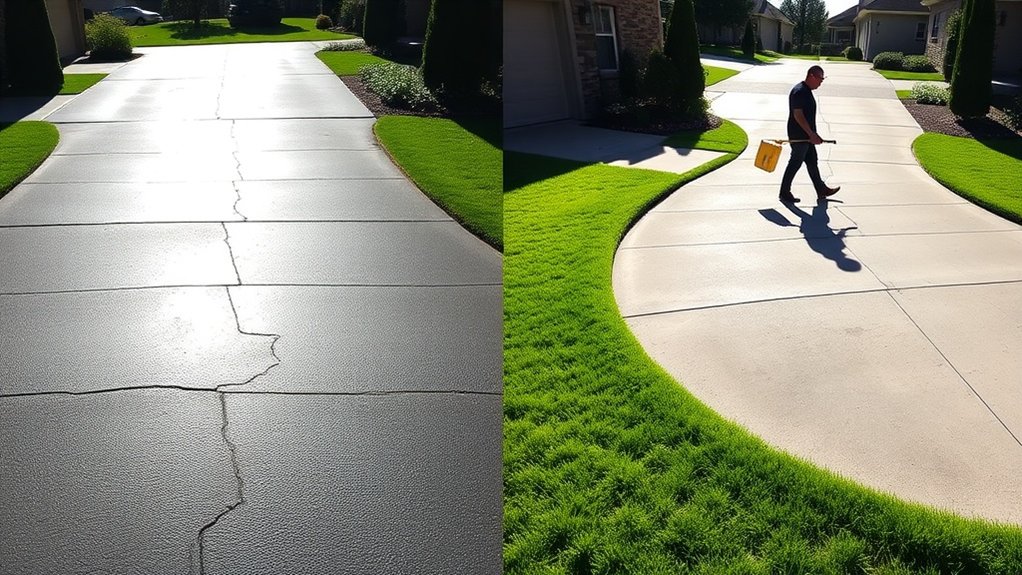
When it comes to driveway maintenance, it’s essential to balance the initial material costs with potential long-term repair expenses.
DIY projects may appear more affordable at first, but errors can lead to costly repairs later. For instance, if you improperly seal your driveway, you might face more extensive damage that requires professional intervention.
In contrast, hiring professionals ensures predictable pricing and typically results in high-quality repairs that can save you money in the long run.
Upfront Material Costs
Understanding the upfront material costs for driveway maintenance is crucial when deciding between DIY projects and hiring professionals. The cost differences can be significant, depending on factors like the materials chosen and their availability.
- DIY projects can save on labour costs, but you might face additional tool expenses.
- Professionals often benefit from bulk pricing, which can lower material costs.
- The quality of work is usually higher with professional installations.
- Prices can vary regionally, affecting your overall budget.
- Complex designs might require specialised materials and expert installation.
Considering these factors will help you make an informed choice for your driveway project, balancing your initial investment with the quality of materials and workmanship.
Long-Term Repair Expenses
When considering driveway maintenance, it’s essential to look beyond the initial material costs and assess long-term repair expenses. Your repair budget will influence your decisions significantly.
While DIY repairs might seem cheaper at first glance, they often lack durability. In contrast, professional maintenance, though pricier upfront, tends to last longer, reducing the need for frequent repairs.
Repair costs can vary widely, ranging from £80 to £2,500, depending on the material and the extent of the damage. Establishing a regular maintenance schedule, which includes sealing and cleaning, can prolong your driveway’s lifespan and lower costs in the long run.
Don’t forget that regional factors like weather conditions and labour rates can affect repair expenses, so factor these into your maintenance plans. Ultimately, investing in professional services can lead to long-term savings and peace of mind.
Environmental Factors Influencing Maintenance Frequency
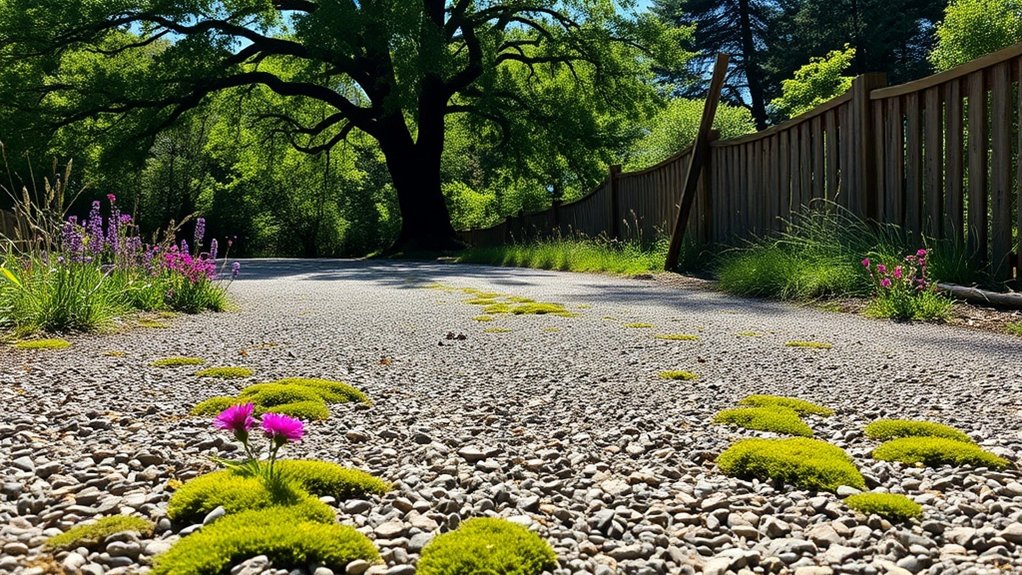
Environmental factors significantly affect how often you need to maintain your driveway. Key elements like climate and surrounding vegetation play a crucial role in your maintenance schedule.
Consider the following:
- Wet climates can lead to moss and mildew, requiring cleaning every 3-4 months.
- Dry climates generally allow for maintenance just once a year.
- Snow and freeze-thaw cycles can cause cracking, increasing the need for repairs.
- Sunlight exposure can degrade sealants, often necessitating resealing in under two years.
- Nearby trees can encourage organic growth, meaning you’ll need to clean regularly to prevent stains.
Being aware of these factors helps you plan for maintenance, keeping your driveway safe and looking good.
Seasonal Care Tips for DIY Driveways

As autumn arrives, it’s important to regularly clear your driveway of leaves and twigs to prevent moisture build-up and staining.
In winter, be careful with de-icing products; using calcium chloride can help protect your driveway from damage.
Fall Debris Removal
While the beauty of autumn leaves can brighten your driveway’s surroundings, failing to clear away leaves and debris can cause long-term damage. Accumulated leaves trap moisture, leading to surface deterioration and potential staining.
Regular cleaning is crucial to prevent hazards like mould and slipping.
- Use a stiff broom or leaf blower for effective removal.
- Clean your driveway weekly or every two weeks during peak leaf fall.
- Check drainage areas to avoid standing water.
- Steer clear of heavy tools that might scratch the surface.
- Combine sweeping with pressure washing for the best results.
Following these steps won’t only enhance your driveway’s appearance but also prolong its lifespan, saving you from expensive repairs in the future.
Winter Chemical Cautions
As winter approaches, the choice of de-icing products can significantly affect your driveway’s longevity. Common options like sodium chloride and calcium chloride can cause severe damage to concrete, resulting in scaling and cracking.
To safeguard your driveway, consider safer alternatives such as sand, cat litter, or beetroot juice salt, which provide traction without harming the surface.
Before winter sets in, ensure you clean and seal your driveway to reduce the impact of de-icing chemicals. Regular snow clearance is also crucial; it helps manage freeze-thaw cycles and prevents water from penetrating cracks.
Challenges of DIY Driveway Repairs
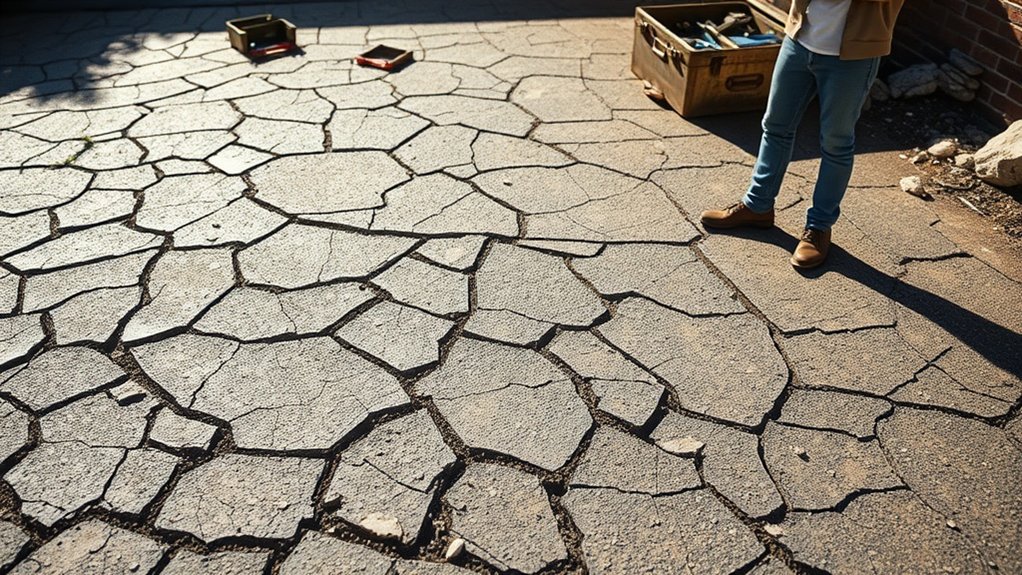
Many homeowners are eager to take on driveway repairs themselves, but they often overlook the difficulties involved. The limitations of DIY tools can impede progress since heavy-duty equipment is often necessary for the job.
Without proper expertise, choosing the right repair materials can lead to unsatisfactory results.
- Repairing a driveway can be time-consuming, causing delays in completion.
- The physical effort required can lead to fatigue and potential mistakes.
- Poor installation can result in premature wear and tear.
- Errors may necessitate expensive repairs down the line.
- Inconsistent blending of materials can create unsightly patchwork.
Ultimately, while DIY might seem appealing, the challenges can outweigh the benefits.
Best Practices for Extending Driveway Lifespan
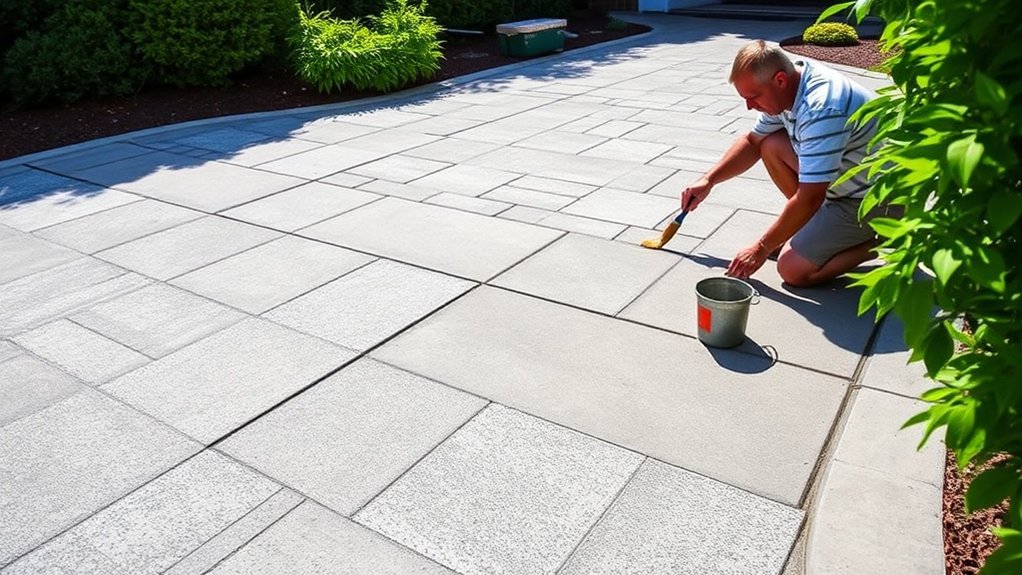
To ensure your driveway lasts as long as possible, it’s important to follow a proactive maintenance routine.
Start with regular cleaning—sweep it monthly and power wash every six months to remove debris that can damage the surface.
Next, apply sealant: asphalt should be sealed every 2–5 years, while concrete benefits from annual applications.
Don’t overlook crack filling; addressing small cracks promptly can prevent larger issues down the line.
Use edging tools every six months to manage vegetation that could compromise your driveway’s structure.
Lastly, consider seasonal care: use plastic shovels in winter and ensure proper drainage to prevent water pooling.
Impact of Heavy Traffic on Driveway Maintenance
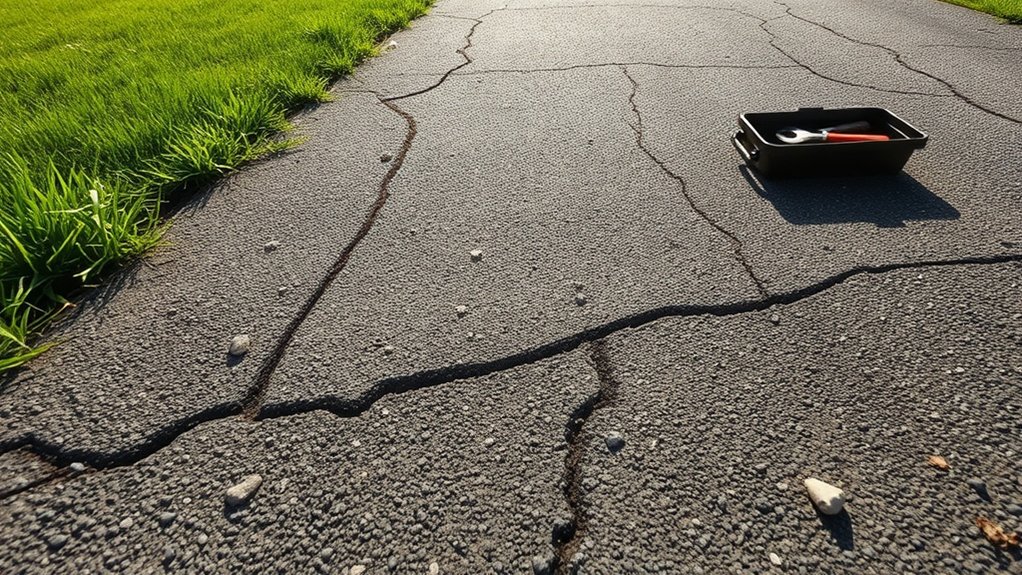
Heavy traffic can significantly affect driveway maintenance, leading to quicker wear and more frequent repairs.
When your driveway is subjected to heavy vehicle loads, it becomes vulnerable to various types of damage.
- Heavy vehicles can cause ruts and cracks over time.
- Asphalt deteriorates more rapidly under consistent stress from heavy traffic.
- Regular inspections are crucial to identify early signs of damage.
- Timely maintenance, such as crack filling, helps prevent water from seeping in and worsening the driveway’s condition.
- Using high-quality materials and ensuring proper installation are essential for longevity.
Signs That Professional Help May Be Needed
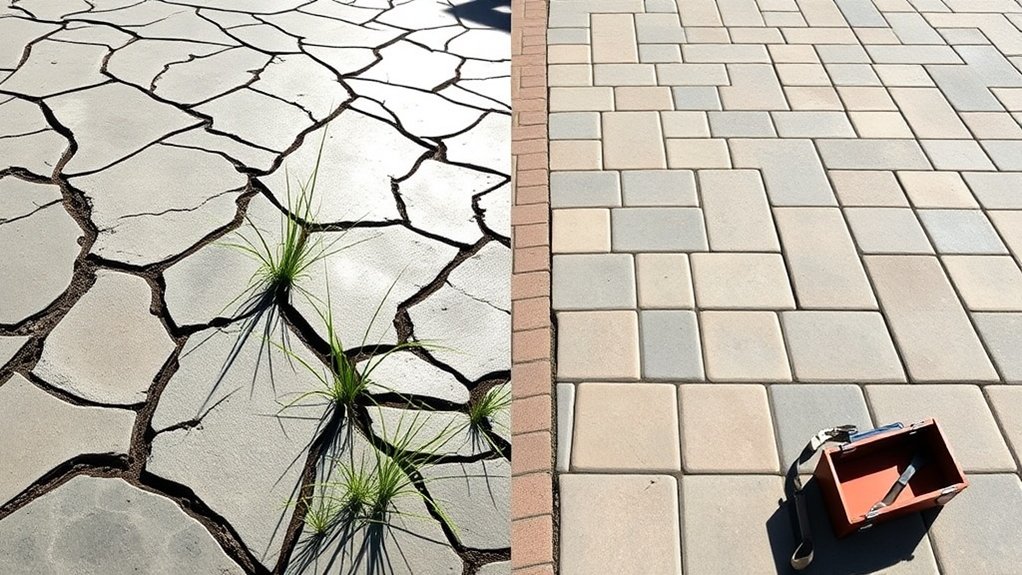
When heavy traffic damages your driveway, recognising the signs that you need professional help is essential. Here are key indicators to look out for:
| Signs of Damage | What to Do |
|---|---|
| Visible Cracks | Assess the cracks; repair them before they worsen. |
| Pooling Water | Investigate drainage options to prevent further damage. |
| Potholes | Address immediately to avoid risking vehicle damage and safety hazards. |
| Raised or Uneven Surfaces | Consider structural repairs to tackle underlying problems. |
| Surface Discolouration & Weeds | Seek maintenance promptly to restore both appearance and integrity. |
Ignoring these signs can lead to expensive repairs and further issues. A professional evaluation ensures your driveway remains safe and lasts longer. Don’t hesitate to seek help when you notice these warning signs.
Frequently Asked Questions
How Often Should I Clean My DIY Driveway?
You should clean your DIY driveway at least once a year. However, if it’s frequently used or exposed to harsh weather, consider doing it every three to six months. Regular cleaning and seasonal maintenance will help maintain its appearance and extend its lifespan.
What Tools Are Essential for DIY Driveway Maintenance?
What essential tools do you need for driveway maintenance? You’ll need a broom, pressure washer, crack filler, sealant, and a selection of applicators. Each tool is vital for keeping your driveway in good condition. For example, a pressure washer effectively removes dirt and grime, while a broom helps clear loose debris. Using crack filler prevents further damage, and sealant protects the surface from the elements.
Can I Use Regular Household Cleaners on My Driveway?
You can use mild household cleaners on most driveway surfaces, but steer clear of harsh chemicals like bleach, as they can cause damage. Regular cleaning helps maintain the appearance of your driveway and prevents deeper stains and potential structural problems. For example, a simple mix of warm water and washing-up liquid can work wonders on oil stains.
How Do I Know if My Driveway Needs Sealing?
As you examine your driveway, take note of any fading colour and surface cracks. If it appears worn, sealing it can offer benefits such as better protection, improved appearance, and a longer lifespan. Regular inspections ensure you seal it in time, helping to avoid expensive repairs later on.
What Are the Signs of Drainage Issues in My Driveway?
You may notice drainage issues in your driveway if you see standing water, discolouration, or cracks. To prevent moisture build-up and protect your driveway’s integrity, consider implementing drainage solutions and proper driveway grading.
Conclusion
When comparing DIY driveway maintenance to hiring a professional, it’s essential to balance cost savings with the time you’ll need to invest. You can handle minor repairs yourself, but ignoring major issues can result in expensive damage later. Factors like weather and how much traffic your driveway sees will determine how often you need to maintain it. Knowing when to do the work yourself and when to call in a professional can significantly extend your driveway’s lifespan.
How can a tarmac driveway enhance your home's appeal? Discover the key aspects of cost, installation, and maintenance in our Read more
Wondering if a tarmac driveway is the perfect fit for your home? Uncover the essential pros and cons before making Read more
Maximize the durability of your tarmac driveway by understanding the ideal weather conditions for installation—discover the secrets to perfect timing Read more

